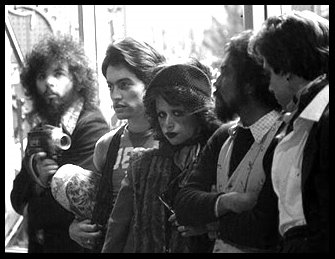
In Venezuela, a marrón claro grande is akin to what most Americans of a certain class would understand as a large latte, no foam: a strong dark coffee with milk. A marrón, plain, is a bit like a macchiato, but a ‘Claro’ indicates it is a bit lighter, due to the addition of more milk. In Caracas people drink marróns like they were shots of water. The ubiquitous little plastic cups of coffee at street-side coffee carts as well as in porcelain cups in French-style cafés, form an easy excuse for breaks of all sorts, and it was always hard for me to figure out how, in a tropical country, little shots of hot coffee became the national drink. Venezuela in particular is renowned, of course, for the quality of its coffee, which can be bought very cheaply in grocery stores. The last time Mr. Gordo and I went we brought back practically a whole suitcase of it, which lasted us a brief couple of months.

It is quite easy in the course of a busy social day to consume up to eight cups of coffee a la manera Caraqueña, which in fact is more like espresso than American drip. Since moving in with Mr. Gordo years ago, I gave away my American-style coffee maker to Skanque Huore and have made my variation on a marrón every morning. For Christmas three years ago my cuñado Quique gave us a cafetière, or moka pot, which I now have with me in Cold City, burnt and stained and rather broken-in. I am so used to the highly caffeinated variation that I find I have to chug regular American coffee to get a buzz now, and find its taste bitter. Is this a parable for a cultural reconquista in reverse? Or rather is this coffee story an allegory of the Latin@ cultural condition, always leaving and returning? For sometimes I think of myself as a Marrón Claro Grande, a bit black, a bit white, and definitely large: a creamy delicious mixture. While I am unsure of the exact answer to these questions, there is nothing that can make the US Latin@ feel more American than actually venturing into the heart and soul of Latin America, and experiencing a Latinidad that is both hyperaware of the colossus to the north as well as blithely unaware of its presence as life goes on. To tell someone in Latin America, outside of maybe perhaps Mexico or Puerto Rico, that you are a US Latin@ is to be met most often with a blank stare. One is either gringo (in the most descriptive manner possible) or not, and there is little in-between.
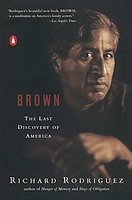
Recently, after struggling with it for many years, I finally finished Richard Rodriguez’s Brown: The Last Discovery of America. It used to be fashionable among Chicana/o intellectuals to have a kind of knee-jerk, almost allergic disdain for Rodriguez, because his first volume, Hunger of Memory, advocated assimilation and raised some uncomfortable questions about Mexican American identity (oh, and also attacked bilingual education and affirmative action). I always read Hunger of Memory less ideologically: for me, Rodriguez’s first book was, in the words of one reviewer at the time, “painful to read, painful to write.” For as much as Rodriguez might have been fucked up, so were we all. In any event, I have followed his work for years, usually pleased with (at the very least) the quality of his prose, but Brown threw me for a loop. Mr. Gordo gave me the hard cover when it came out and I read and re-read the first forty pages for years. There was something about it I found profoundly annoying, and just put it aside. Upon finally finishing it, I don’t think I have a better opinion of the work, but his idea of "Brown," of the syncretic power of Latin@s, the force of change contained within Latinidad(es), was interesting, if also a re-hash of the best work of Chican@/Latin@ scholarship of the past twenty years.
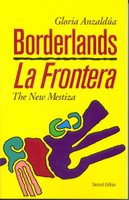
Ostensibly, “Brown” is the idea of Latin@ resistance to didactic interpretation and binary oppositions. Rodriguez meanders through the idea sloppily passing for lyrically, borrowing and appropriating the work done by Anzaldúa, Moraga, Gómez-Peña, Hicks, and many others along the way, but with the addition of his own anglocentric erudite tradition, arguably an attempt to broaden the scope of Latinidades for Anglo-bourgeois readers in the cities and well-heeled suburbs of the Eastern American seaboard. A mission, I suppose, which is laudable in certain ways. The frustrating thing is that it is impossible to get under his argument in/on “Brown.” Hints, gestures, movements, but never does our literary eye center and focus on the idea of “Brown” succinctly defined, which I suppose is part of the strategy. (Rodriguez’s) “Brown” resists definition, is fleeting, floating, wandering. And in its inchoate formations and dissolutions is to be found, to follow the line of thinking in the text, the future of America (as in the US variant).
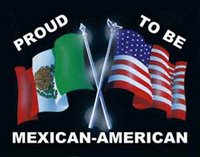
Perhaps this is true, even as I am prone to rolling my eyes at the frequent proclamations of the transformative power of Latinidades on the United States. It’s not that Latin@s aren’t changing the material and social conditions of American life as we speak, it’s just that I see that project as a quiet rather than loud one. One day, you’ll turn around and it will have already happened, no fanfare and no parade. But for now, the Anglo hand wringing of the current moment, yes, lots of it, and fences, more fences: the ultimate symbol of futility and ignorance of how the world works.

Even in spite of these qualms, OK, I’m down with the “Brown,” but there was one passage that struck a personal note for me. Rodriguez at one point, in an ill-tempered screed against racial identities in the USA, details talking with a light-skinned Chicana at Yale who described herself as a person of colour, to which he claims “She doesn’t get it” (i.e. the idea of "Brown," which is profoundly anti-didactic). This made me think of myself, of course, as a light-skinned Mexican American who has been known, on occasion, to also describe himself as a person of colour, more out of political necessity than mere descriptive, which in some senses is the very function of race in our society, hyper-aware as it is of race and racial difference: race as identity has become divorced from the body and lives in the realm of institutional and political and social paradigms. This of course is not a function of people of colour wanting to be different. I understand this move rather as a function of living in a formerly formal white supremacist society that for 200 years was also a slave society. Epistemological racial identities are very important in a slave society, for it tells us who is free and who is not. For mestizo people like most US Latin@s and Black Americans, what is really Black or Brown/Bronce? Our bodies reveal the complicated racial histories that we literally embody, often with great colour and phenotypical diversity within single families, yet we have gathered under race, or pan-ethnicity, or rather both, in processes which are both internal and external, reinforced and codified by all the forces which act upon us in society. The technologies of self-description which Rodriguez pans in his snarky descriptive of the güera Yalie struck me as both unnecessarily pointy as well as provocative. For “Brown” does seem to call for a new manner of self-description, both on the individual as well as social level. But as a society we don’t seem to be ready for that particular launch into the stratosphere of theoretical amorphous “Brown” identities just quite yet.

I am currently teaching a Latina/o Studies class, and my students, both the Latin@ and the non-Latin@, have been having a difficult time understanding this series of key ideas, of indeterminacy, of mestizaje, of collective identities organised around a concept of self-conception rather than the exclusive physical referent, and how they relate to the course’s (i.e. my) project vis-à-vis Latin@ identity. After struggling through some interesting work, covering and re-covering discussions of pan-ethnicity, race, mestizaje, cultural strategies, assimilations, adaptations, the body, ideas about identities in formation and Latin@ diversity for the past several weeks, a student of mine, a good student, posed this question in class the other day: “But what then exactly is a Latino?” I wanted to lay my head on the desk and take a nap until Teacher woke me.

What struck me about this moment in class was the resistance to the resistance, in the sense of understanding Latin@ identity as inchoate and messy and travelling and “Brown.” Students don’t want this, and one could argue society doesn’t want it either. Rather, what they want is the ability to “be able to tell.” A standard enough desire in our Enlightenment tradition, and one I both relish and dread disabusing my students of. For the simple fact of the matter is that even most Latin@s can only give you either an almost purely subjective analysis of Latin@ identity (usually their own), or the most general fluffiness: “They’re Catholic” (Not exclusively); “They all speak Spanish” (Wrong again! No Gold Star for you!!). On one hand, I feel for my students. They didn’t expect to fall into a void when they signed on for the class. They might have even felt they would gain some practical knowledge for dealing with “them” (i.e. Latin@s) in the real world. If my students are listening closely, and I know at least some of them are, they will realise that indeed they are learning a lot about Latin@s, just not what they expected to learn: the shape, the scent, the feel of things.

The class has dovetailed with a civic project I have been engaged in, a committee of (rather nuts) Latin@s that meets monthly: the butcher, the baker, the candlestick maker, and the Professor (me). Oh Mary, don’t ask! The last meeting we descended into a crazy bilingualism that gave some of the members of the committee pause: which language should we be speaking? Some were speaking mostly Spanish, others (me, primarily, because I am a sin vergüenza) mostly English, and others yet mixing the two more fluidly. There seemed to be a desire on the part of some committee members to speak either English or Spanish, exclusively. For me, the crazy linguistic moment, with phrases passing half-understood and others more completely comprehended, is itself a parable of the Latin@ condition, and instead of being resisted, needs to be embraced, even as it is scary and potentially risks misinterpretation in the process. But then again, two people can misunderstand each other speaking the florid and dense prose of a single language as well. When I related this story of the linguistic Babel of the committee to Mr. Gordo, he observed that the one thing that must be resisted (for Latin@s) is monolinguality, and this could be understood socially and culturally as well as linguistically. Not the mono, but the polyphonic.
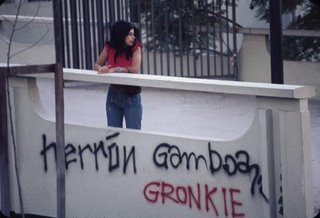
I’m not sure about Rodriguez’s güera Yalie not getting it, but suffice it to say I think the problem is that “getting it” is itself part of the conundrum. It’s not that there is nothing to understand, no material rubrics to apply, rather it is that Latin@ identity is moving so fast, is so fleeting, that by the time you capture it in a frame it is already gone, moved on to its next project, stretching out into the world, curious, intemperate, impatient. This sounds great on paper, but is quite the struggle to communicate in a classroom, not to mention figuring out one’s relationship to the chaos in one’s personal life. It can, in fact, lead one to experience asco, nausea, which was the name of the controversial Los Angeles-based seventies Chicano conceptual art group whose images lead and end this piece (They earned their moniker when one Chicano activist described their work as giving him asco). In both the sense of the work and direction of Asco in the 1970s and contemporary Latin@ identities, the asco of the void displaces our assumptions, forces continual changes, adaptations, and adjustments, but also more powerfully grounds us in the here and now, the rocky terrain of contestation.



5 comments:
I too have had trouble wrapping my head around Brown, even (especially?) as an Anglo from the "Anglocentric erudite tradition." I understand the objections to Hunger of Memory, and the kind of fraught place that Rodriguez seems to occupy in the national consciousness of letters (I recall my bafflement at some of the reverent reviews I saw when the book first came out).
Sure, Brown rehashes Anzaldua et al., and sure it does so in slippery ways...What I found most compelling about the text was its suggestion of the very term "brown," one with the potential to enter the lexicon as a destabilizing force in much the same way "queer" did in the early 90s.
Alas, it seems not have done so, and about that I am ambivalent, as I remain about Rodriguez's book generally.
Horace (f/k/a Cats & Dogma)
I just wrote a long, long response/question about my experience being "brown" (African-American) and issues concerning the Latino/a community in New York and Nashville.
I am pissed. So, I am going to just get to the heart of the manner.
In your opinion, how are African-Americans constructed in Mexico? Are we a caricature? Are we deemed poor? Are deemed lazy? What does your average person think coming here (?), not necessarily the academic world where many things concerning the New World intermingle and have been intermingling for some time now through schools of thought, literature, anthropology and history. I have worked and lived in many places and have studied Caribbean and Latino literature and history for some time, I just don't have time to get into the details, but my latest work experience with Mexicans down south was very eye opening, and marcated a clear difference between Meso-America and the Caribbean in some very contemporary and clear relationships. The Caribbean world has a relationship with Americans from the adoption of the racial equality struggle onward, not to mention the plantation, this seems to shape out political discourse through points of similarity. I like to think of it as "rice and beans", mine are from New Orleans and other people bring their recipe from different islands.
Working with Meso-Americans and Brazilians, there were different relations concerning race and culture and after 18 months of working with them I am not sure what they were. After dealing with some pretty crazy altercations concerning race and sexauality I wanted to question people around me more thoroughly, but my Spanish (spoken) is not the best.
I do apologize. I don't want to call you out or seem so "base", I just don't have time to flesh out my observations the way I had written them earlier. I will dedicate a post on my blog to reconstructing the question in even greater detail. I was just compelled to write after reading your arcile of Rodriquez who I keep at a distance like Charlie Rose, Lou Dobbs and the 60 Minutes crew because I find their questions and views to be more about assimilation or masked in some weird Edwardian sense of trying to figure out what the natives are saying. But I will pick up "Brown" at some point and hope to have a discussion with you about my readings and work concerning Latino culture which is pretty varied.
Richard Rodriguez' prose in Brown is so dense, so much like free association, I just don't even understand it. I'm impressed that anyone does. I can easily imagine needing to re-read the first 40 pages. I can't imagine reading the whole thing with any comprehension. You're a better man than I (well, yeah).
Professor Antiquity writes offline from afar:
"Just read your post on Rodriguez' *Brown*, a book I picked up and started reading but then found myself distracted from finishing. One thing that interests me in your post is that I don't see any mention of one of the most obvious (yet so often occluded) aspects of whatever it is we mean by Latino, and also secondarily (if I'm not mistaken) of your own background: the Native. Not, or not only, "black and white" but also "red and white," no? Just look at that photo of Rodriguez himself!"
Indeed, the mention of this synthesis between races and cultural traditions is contained within the concept of Mestizaje, the mixing of the African, the Indigene, and the European to create the mestiz@. The complexity of Mestizaje (or, in English, a poor translation, micegenation) tends to be elided in US discourses, where people assume that the mixture is purely racial, and results either in a mongrelisation (the classic Anglo racist move of the 19th Century) or falls under the new-ish, touchy-feely rubric of "mixed race identity." But Mestizaje as a phenomenon was/is contested, strange, violent, wonderful, redemptive, and damning: with cultural, social, political, and economic, as well as racial, dimensions. If Mestizaje is integral to our understanding of the Latin@, then the Latin@ becomes the public face of the processes that have created our hemisphere: consensual and coercive joining and couplings and creations that combine to form the unique variant of American (in the larger sense, the hemispheric sense). The conceit of anglophone North America has always been to contain these contacts, these pollutions, even when human nature at the very least tends to be omnisexual, and most of us qualify as mixed race, on some level. But most of us, again, prefer the convenience of thinking ourselves racially whole, complete, even when the evidence to the contrary surrounds us.
This is one reason why Littlemilk's comment above I found challenging. Just because a population descends or flows from a process such as Mestizaje (again, both wonderful and horrible) does not guarantee racial enlightenment, per se. I cannot vouch for how New Latin@ immigrants regard Blackness, although some studies, which you can Google, identify a tendancy on the part of all immigrants, including Latin@s, to assume the racist postures of the dominant (white) culture, which is, as an understatement, unfortunate (aka Black-Brown Conflict, etc). My impression is the more assimilated one is into the infrastructure of anglophone America, the more one reaches out and develops (potentially) connections with Blackness and African American communities, individuals, and experiences. At the very least, this was my experience. In the narratives of Black America I found a complementary voice of struggle and joy, a literary, social, and cultural relationship that grew and thrived when I was away from Aztlán and on the East Coast of the United States. We are surrounded by the fusions of youth and popular culture, but this in and of itself does not again guarantee a greater enlightenment nor identification with the particular and historically specific struggle of Black Americans. If I were to be flippant, US Latin@s, especially our leadership classes, have either identity envy ("African America has true community, we do not because we can't get our shit together. Wah!") or disdain ("I/We am NOT like Black people" i.e. trouble).
In one of my courses, on American immigration, I always emphasise to my students the importance of slavery in forming the society that we live in, and how we all, whether we've been here for 200 hundred years or arrived yesterday, live within the shadow of that moment in our national history. How US Latin@s interact and develop connections (or indeed refusals) of Black America will no doubt form the challenging frontier of the coming century. There is no option out of this situation, for the White-Black dyad is the bedrock of the American experience, one actually that finds wry complaint by Rodriguez in *Brown*. Latin@s, like Asian Americans, have to figure out what it means to be in the middle of this drama, and potentially shift and change it, not in an effort to erase it, but to make room for other voices in a stuffy and heated room.
All of which is to say, in this regard I may only speak for myself, and I find Black history and experience informs, in particular ways, Latin@ identity, and is complementary, not competitive, with Latin@ experience. After all, I consider Black America as mestizo as Latin@ America. However, as a caveat, with other Latin@s, your mileage may vary.
Just because a population descends or flows from a process such as Mestizaje (again, both wonderful and horrible) does not guarantee racial enlightenment, per se.
Very important point. Very important point re slavery also.
And - the _idealization_ of mixture and indeterminacy is problematic.
Post a Comment